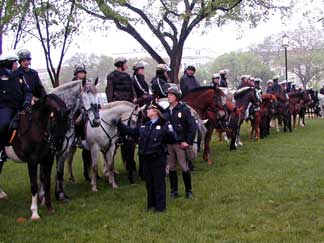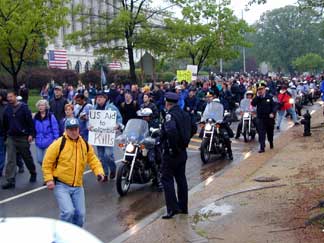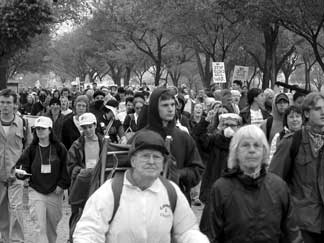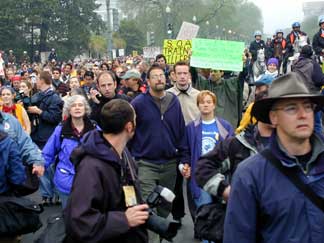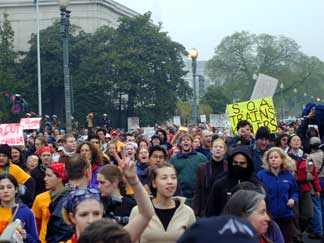|
Twin Marches Cap Protests
Clashes Break Out Over Middle East Conflict, Colombian Civil War
By Steve Twomey
Washington Post Staff Writer
Tuesday, April 23, 2002; Page B01 (EDITED)
Four days of multi-cause street actions in Washington culminated yesterday in twin demonstrations rooted in conflicts overseas, the first a morning march centered on the Colombian civil war and the second an evening gathering of pro-Palestinian marchers that closed Connecticut Avenue and led to angry exchanges with supporters of Israel.
Kept apart by barricades and scores of police, sympathizers from both sides of the Middle East impasse traded accusations last night outside the Washington Hilton, where the American Israel Public Affairs Committee is holding a three-day conference that includes speeches by three former Israeli prime ministers.
Several hours earlier, 37 people were arrested as part of the Colombian march, in which a vocal corps of demonstrators snaked from the Washington Monument to the U.S. Capitol to protest U.S. aid to the South American nation, which they allege exacerbates its civil war.
The morning and evening protests capped a string of news conferences, workshops, processions and park gatherings that began Friday and featured an unusual amalgam of groups, all gathering on the same long weekend in a quest for solidarity and maximum media coverage.
During the four days, demonstrators excoriated the World Bank, the International Monetary Fund and multinational corporations, and raised banners highlighting numerous other alleged political and environmental problems around the world. The largest rally, a Saturday gathering estimated by police at 75,000 people, was dominated by pro-Palestinian marchers.
Although there were more than 100 arrests over the four days, no violence broke out as local and federal police responded with an overwhelming presence of officers on foot, on horses and on motorcycles and bicycles, even drawing upon departments from the suburbs.
The Colombian march, which stepped off at 7:15 a.m., held the potential for commuting chaos downtown, because organizers had not obtained a march permit and had suggested there would be acts of civil disobedience.
That led police officials to express concern that the final day of protests would be the worst. But a show of force by District and U.S. Park Police officers -- and the brisk pace of the walkers -- kept traffic disruptions minimal and temporary.
Another factor, Ramsey said, was that many downtown workers apparently heeded pleas to take Metro instead of drive, and indeed train ridership was about 19,000 passengers greater than it is on a typical Monday, according to the agency.
Shoving broke out sporadically in the early morning mist as police officers tried to block and rechannel the march at various points. Organizers complained bitterly after police surrounded the demonstrators in a park near the Capitol and temporarily kept them from leaving for another park where they had planned to assemble.
The 37 people were arrested in two separate incidents after they sat down in streets near the Capitol, held hands and sang. One group said it came from the Oberlin (Ohio) College Rainbow Revolutionaries and the other from various Catholic organizations.
All but one were released after being charged with obstructing traffic. They will appear in D.C. Superior Court at a future date, said Lt. Dan Nichols of the Capitol Police. The only one not released refused to give her name, police said.
"It was not confrontational," Nichols said. "These were acts of civil disobedience. We're prepared to deal with it."
In all, Ramsey said, there were about 2,000 people in the march, whose organizers had envisioned it as a kind of public service announcement about Colombia aimed at the federal government. In addition to U.S. military aid, protesters focused on a school in Georgia at which the U.S. military has trained Central and South American officers; and on operations in Colombia intended to destroy drug crops but that organizers said destroy food supplies.
"Today is another day to fight for peace and justice!" shouted protest organizer Gordon Clark, of Silver Spring. "Are you ready to fight for the poor, and the dispossessed and the other victims of U.S. military aid to Colombia?"
Organizer Carol Richardson, 58, an Iowan from a group called Witness for Peace, said she was sorry "if people are inconvenienced" by the march, but "we do want people to pause a minute and understand that their tax dollars are being used in a way that they would not support."
Marchers expected to wend their way from the Washington Monument to Upper Senate Park, near the Capitol. But at a smaller park at C and Delaware streets NE, they found themselves surrounded by District and U.S. Park police and unable to leave. Richardson told the crowd to remember their pledges of nonviolence, and that people in Colombia suffer worse repression every day because of U.S.-financed violence.
"The police are falsely imprisoning children, adults, peaceful activists," said Mara Verheyden-Hilliard, a lawyer for the District-based Partnership for Civil Justice. "This is illegal and false imprisonment."
About 8:50 a.m., the police lines relented, and the crowd was allowed to reach Upper Senate Park.
Staff writers Amy Argetsinger, Petula Dvorak, David A. Fahrenthold, Manny Fernandez, Hamil R. Harris, Serge Kovaleski, Lyndsey Layton, Carol Morello, Arthur Santana and Debbi Wilgoren contributed to this report.
© 2002 The Washington Post Company
|

